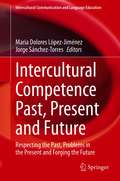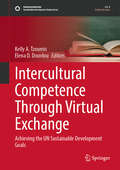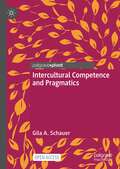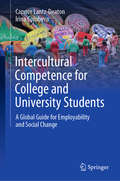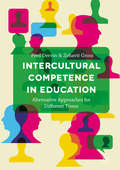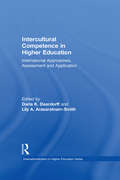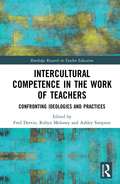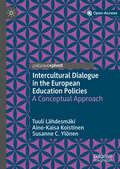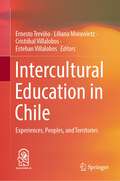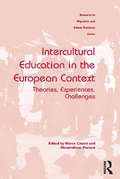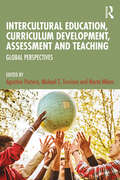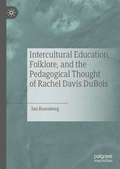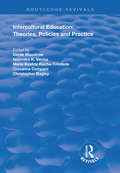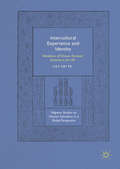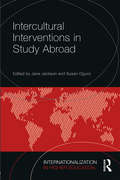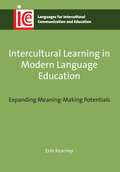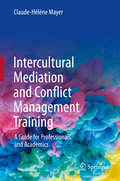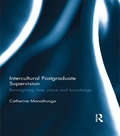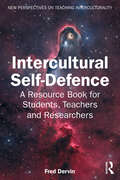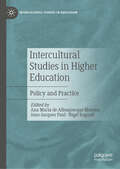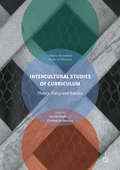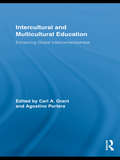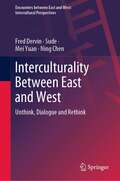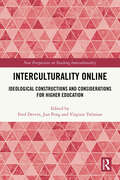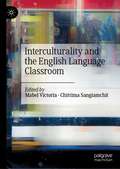- Table View
- List View
Intercultural Competence Past, Present and Future: Respecting the Past, Problems in the Present and Forging the Future (Intercultural Communication and Language Education)
by María Dolores López-Jiménez Jorge Sánchez-TorresThis book explores the benefits of teaching reflection upon one’s own culture to develop intercultural competence and looks into the relationship between the proficiency level of the second language and the target culture. It introduces new debates on the concept of ‘critical cultural awareness’ in intercultural learning and teaching, for example the indiscriminate use of terminologies related to the idea of ‘intercultural encounters’. Also, it provides insight into the relationship between language and culture using a new tool such as the Autobiography of Intercultural Encounters through Visual Media. The presentation of different approaches, tools, barriers, educational and cultural realities, online intercultural exchange projects and concepts such as motivation, attitudes, stereotyping, otherization, and critical cultural awareness makes this book an excellent instrument not only for teachers but also for researchers, policy-makers and private and public institutions that want to explore culture and interculturality and to promote an intercultural competence and global citizenship among its learners / users / clients and / or an interculturally-oriented language education.
Intercultural Competence Through Virtual Exchange: Achieving the UN Sustainable Development Goals (Sustainable Development Goals Series)
by Kelly A. Tzoumis Elena D. DouvlouThis book addresses the importance of sustainability and environmental worldviews and the role of intercultural competencies in achieving SDGs acceptance and their effective implementation. Particularly since the pandemic, there is a growth in online education, and this offers opportunities for educators and students that can be exploited with a focus on sustainability. The book provides examples of virtual exchange including Global South and Global North with tools ranging from Project-Based and Community-Based Service Learning, Debates, Environmental Games and Simulations, Virtual Reality/Augmented Reality, and Accessibility and DEI issues. Additionally, issues of social justice and digital colonialism are a thread through several of the chapters. By providing a broad range of global learning experiences from scholars across several continents from various disciplines that include various post-secondary education based on tools and best practices, the book is a great resource to academics, researchers, and students on approaches to education that prepare the learner for praxis and effective implementation of sustainable solutions for their professional and social future perspectives. Chapter "How can we raise global citizens at home: Evidence from an intercultural virtual collaboration between the Netherlands and Japan" is available open access under a via link.springer.com.>
Intercultural Competence and Pragmatics
by Gila A. SchauerThis Open Access book examines the link between intercultural competence (IC) and pragmatics by asking frontline modern foreign language teachers in higher education teaching a variety of languages (e.g., Dutch, English, French, German, Italian, Spanish, Swedish) how they conceptualise intercultural competence and which skills, competences and knowledge they consider important in their teaching contexts. The data were collected with an online survey that focused on the relationship between intercultural competence and pragmatics.While international organizations such as the United Nations Educational, Scientific and Cultural Organization (UNESCO) or the Council of Europe (CoE) agree that intercultural competence should play an important role in education, it is not always clear what IC may encompass in specific teaching contexts and subject areas. Examining how modern foreign language teachers in higher education conceptualise intercultural competence and the value they attach as well as the attention they give to various areas of pragmatics in their teaching is highly important, since those language professionals may be the final teachers learners encounter during their formal foreign language education. They are therefore in a unique position to shape modern foreign language learners’ intercultural and pragmatic awareness, competence and skills.This book will be of interest to language professionals, modern foreign language teachers and teacher trainers, as well as students and scholars of applied linguistics, pragmatics, and language education.
Intercultural Competence for College and University Students: A Global Guide for Employability and Social Change
by Irina Golubeva Caprice Lantz-DeatonThis practical guide is a must read for students interested in developing the attitudes, knowledge, skills, and values that foster positive relationships with people from diverse cultures both within and outside of the workplace. It contains real-life examples from students drawn from the authors’ work across different countries. In an age of growing diversity and increasing global mobility, living and working with people from different cultural backgrounds is becoming the norm. To address this complex topic, the authors invite students to consider key questions such as: How do our cultural backgrounds influence our behavior towards others? What is intercultural competence and how can it help students to get along in work and life? How can institutions help students to develop intercultural competence? What does it have to do with topics like prejudice, discrimination, and racism? How can intercultural competence facilitate social change and help students to succeed in their careers?Written for students in any country and studying in any discipline, this book includes practical activities designed to help students to develop intercultural competence throughout their time at college or university. It is useful for students as an autonomous learning source, or as a resource for taught courses.Drawing on a comprehensive and rigorous knowledge of the field, the authors have written a thought-provoking analysis and a practical guide to understanding and enacting Intercultural Competence. I learnt from and admire their ambitious vision of the significance of intercultural competence for society and for the lives and careers of their readers.— Michael Byram, author of Teaching and Assessing Intercultural Communicative Competence, Durham University, UK This is a wonderfully readable book, which carefully and clearly explains the concept of intercultural competence, exploring its implications for addressing many of the most crucial issues facing the world today. Based on impeccable scholarship, and containing a wealth of practical activities, this book is highly recommended for students and interested laypeople alike.— Martyn Barrett, University of Surrey, UKAn exceptionally user-friendly and theory-informed guidebook that would not only benefit university students but anyone with an interest in intercultural communication. The book is second to none in terms of clarity of presentation and coverage of concepts, models and practical ideas relevant to intercultural competence for the contemporary society. —Anwei Feng, University of Nottingham Ningbo, ChinaAn essential handbook and excellent addition to conventional textbooks. Nuanced and down-to-earth explanations about intercultural communication which are accessible to everyone. Insightful explanations for educators and students alike. Easy to use self-study guide with thought-provoking exercises. This book has been long needed and has come at just the right time. --Ivett Guntersdorfer, Founder and Director of the Intercultural Communication Certificate Program, Ludwig-Maximilians-Universität München, Germany
Intercultural Competence in Education
by Fred Dervin Zehavit GrossThis book explores the concept of intercultural competence, focusing specifically on education. Intercultural competence can vary depending on the field of research or the context of application and has therefore developed over recent decades. As the world becomes increasingly global intercultural competence has become even more important but it is still not practiced satisfactorily. This book highlights views which are at odds with official and orthodox positions on intercultural competence to encourage fresh approaches to intercultural competence. It will be invaluable for researchers, practitioners and students interested in the global possibilities of education.
Intercultural Competence in Higher Education: International Approaches, Assessment and Application (Internationalization in Higher Education Series)
by Darla K. Deardorff Lily A. Arasaratnam-SmithIntercultural Competence in Higher Education features the work of scholars and international education practitioners in understanding the learning outcomes of internationalization, moving beyond rhetoric to concrete practice around the world. Devoted exclusively to exploring the central learning outcomes of internationalization efforts, this edited volume contains a refreshing combination of chapters and case studies from interdisciplinary and cross-cultural contributors, including: cutting-edge issues within intercultural competence development, such as intersectionality, mapping intercultural competence, and assessment; the role of higher education in developing intercultural competence for peacebuilding in the aftermath of violent conflict; facilitating intercultural competence through international student internships; interdisciplinary and cross-cultural contributions from over 19 countries including Japan, Russia, Serbia, South Africa, and Vietnam; the latest research and thinking on global, intercultural, and international learning outcomes, with a unique emphasis on newer voices. Intercultural competence has become an essential element in international as well as domestic education. This text provides the latest thinking and research within the context of internationalization, presents practical case studies on how to integrate this into the preparation of global-ready students and will be of interest to postgraduate students, international education administrators, and practitioners, as well as scholars and researchers in a variety of disciplines who have an interest in intercultural and global competence.
Intercultural Competence in the Work of Teachers: Confronting Ideologies and Practices (Routledge Research in Teacher Education)
by Fred Dervin, Robyn Moloney and Ashley SimpsonThis book critiques models of intercultural competence, whilst suggesting examples of specific alternative approaches that will successfully foster intercultural competence in teacher education. Bringing together diverse perspectives from teacher educators and student teachers, this volume discusses the need to move beyond essentialism, culturalism and assumptions about an us versus them perspective and recognises that multiple identities of an individual are negotiated in interaction with others. Intercultural Competence in the Work of Teachers is divided into four sections: critiquing intercultural competence in teacher education; exploring critical intercultural competences in teacher education; reflexivity and intercultural competence in teacher education; and indigeneity and intercultural competence in teacher education, providing a methodological approach through which to explore this critical framework further. This book is ideal for teacher educators or academics of education specialising in global education who are looking to explore alternative perspectives towards intercultural competence and wish to gain an insight into the ways it can be utilised in a more effective and productive manner.
Intercultural Dialogue in the European Education Policies: A Conceptual Approach
by Tuuli Lähdesmäki Aino-Kaisa Koistinen Susanne C. YlönenThis open access book analyses intercultural dialogue as a concept, policy and ideal in European education policy documentation. The core European transnational organizatons – the Council of Europe and the European Union – have actively promoted policies to engender inclusive societies and respond to challenges that diversification may entail. This book, in turn, offers suggestions for improving education policies in super-diversified Europe and beyond, where there is an increasing need for cultural understanding and constructive dialogue. The authors utilize concept analysis to reveal how these organizations seek to deal with dialogue between cultures, as well as weight given to cultural differences and intercultural encounters. This book will be of interest and value to scholars of intercultural dialogue and European education policies.
Intercultural Education in Chile: Experiences, Peoples, and Territories
by Ernesto Treviño Liliana Morawietz Cristóbal Villalobos Esteban VillalobosThis book examines the status of intercultural education in Chile. It does this through three axes: the first is multidisciplinary, including historical, anthropological, sociological, and pedagogical, to account for varied aspects of the Chilean intercultural education. The second is the consideration of multiple indigenous peoples, analyzing students’ groups or indigenous peoples, such as the Rapa Nui, Aymara, or Mapuche. Finally, the book has a multilevel perspective that recognizes that educational policy involves different actors, from the central government to local communities.The book incorporates study material enriched with the experience and analysis of different perspectives and methodologies of its authors, being useful for understanding intercultural education in the country. It is a versatile resource for understanding this topic, as well as a support for the development of programs and policies.Translation from the Spanish language edition: Educación Intercultural en Chile. Experiencias, pueblos y territorios by Ernesto Treviño, et al., © Ediciones UC 2017. Published by Ediciones UC. All Rights Reserved.
Intercultural Education in the European Context: Theories, Experiences, Challenges (Research in Migration and Ethnic Relations Series)
by Marco Catarci Massimiliano FiorucciThis book offers a comparative analysis of the intercultural theories and practices developed in the European context. Bringing together work on the United Kingdom, France, Germany, Italy, Spain, Greece, The Netherlands and Sweden, it examines specific approaches to intercultural education. Structured around a series of core questions concerning the main features of diverse groups of migrants present within a country and within schools, the major issues raised by scientific research on the presence of migrant students, and the adoption of relevant educational policies and practices to address these issues - together with examples of best practice in each case - Intercultural Education in the European Context explores the strengths and weaknesses of the intercultural education approach adopted in each context. Offering a broad framework for the study of intercultural education as adopted in European settings, the book highlights the contribution of education to the development of a fair, democratic and pluralistic Europe. As such, it will appeal to scholars and policy makers in the field of sociology, migration, education and intercultural relations.
Intercultural Education, Curriculum Development, Assessment and Teaching: Global Perspectives
by Michael S. Trevisan Agostino Portera Marta MilaniThis edited volume explores the specific ability of the school setting to promote intercultural education as an approach to address contemporary, societal issues of justice and social inclusion.Highlighting the importance of schools as one of the first areas where diversity is encountered and experienced, this book offers case study chapters on the most recent pedagogical approaches, research questions, and frameworks for intercultural education and teaching. To address these approaches, the book uses comparative studies, systematic reviews, case study analyses, and theoretical and conceptual discussions. Written by an international team of experts in the field, chapters address new challenges in curriculum development for intercultural education and illustrate innovative ways to provide instruction through the use of technology and the arts. Fusing conceptual and methodological approaches, the book examines interculturality and associated instruction within schools, further exploring the frameworks and methodologies that govern contextually based, culturally responsive education.Offering in-depth treatment of cutting-edge pedagogies used to teach interculturality in culturally diverse settings, this book will be of interest to educators, researchers, and students studying intercultural education and studies, multicultural education, and the sociology of education more broadly.
Intercultural Education, Folklore, and the Pedagogical Thought of Rachel Davis DuBois
by Jan RosenbergThis book provides a history of the Quaker educator and intercultural education pioneer Rachel Davis DuBois (1892-1993) that explores the period in which DuBois lived and the key works she created. The opening section establishes the disciplinary contexts of her work, education, and folklore, and the subsequent sections present DuBois' pedagogical methods as they were developed and exemplified by her programs. Throughout the narrative, Rosenberg includes reflections on her own experience as a practitioner of the intercultural and folklife education DuBois championed.
Intercultural Education: Theories, Policies and Practices (Routledge Revivals)
by Giovanna Campani Gajendra K. Verma Christopher Bagley Derek Woodrow Maria Beatriz Rocha-TrindadePublished in 1997, this volume is a result of a number of European Union and Council of Europe initiatives. The major stimulus came from an intensive course held in Lisbon in 1994 as part of two Erasmus networks exploring the nature of intercultural studies on a European-wide basis. Although the concepts of multiculturalism and interculturalism have frequently been discussed within a British context, this book draws on the interlocking and comparative persectives of specialists in education and teacher training in several European countries including Spain, France, Italy, Britain and the Netherlands. Educational policies and theories of identity are compared and there are special sections in multilinguism, teacher training, curriculum development, relationships between different ethnic groups and a vision of the future of intercultural education in Europe. The issues discussed in the book are significant in the development of modern societies as they seek to come to terms with the revolution in intercultural relations brought about by mass communications and global transport. The world is rapidly having to come to terms with cultural and social differences which can no longer be kept separate in their protective groups.
Intercultural Experience and Identity: Narratives of Chinese Doctoral Students in the UK (Palgrave Studies on Chinese Education in a Global Perspective)
by Lily Lei YeThis book examines the identity formation and negotiation of Chinese doctoral students in the UK, and the opportunity for self-transformation this experience offers. As the largest group of international students in the English-speaking world, Mainland Chinese students encounter a range of difficulties and prospects that may be relevant to the wider international student community. Using extensive qualitative and empirical data, the author explores the narratives of eleven Chinese doctoral students at two British universities through a sociological perspective. Balancing analysis with solid theoretical framework and the voices of the students themselves, the author moves away from essentialism and ‘othering’, instead shining a light on the effects of globalisation, internationalisation and recent policy strategies. This volume will be of interest and value to students and scholars of comparative and international education, identity formation, intercultural communication, the sociology of education and study abroad.
Intercultural Interventions in Study Abroad (Internationalization in Higher Education Series)
by Jane Jackson Susan OguroAs a consequence of globalization and internationalization, there has been a dramatic increase in the number and diversity of students who are gaining international educational experience. Making connections between contemporary study abroad research, theory, and practice, Intercultural Interventions in Study Abroad describes innovative programmes that have been designed to deepen the intercultural learning and engagement of student sojourners. In addition to reviewing the benefits and limitations of these interventions, this volume offers recommendations for further enhancements in the field. Exploring examples of intercultural interventions in a wide variety of countries from pre- to post-study abroad, this book helps readers develop a critical awareness of their strengths and limitations, and provides directions for future developments in intercultural pedagogy. Written by intercultural educators and study abroad scholars from different parts of the world, each chapter describes an innovative pedagogical intervention that has been designed to enhance intercultural learning and engagement, including: designing and implementing pre-sojourn intercultural workshops; using guided, critical reflection to deepen students' intercultural learning and engagement; monitoring class interaction to maximize intercultural learning; optimizing intercultural learning and engagement abroad through online mentoring. Truly international in scope, this text is essential for study abroad professionals who seek to enhance the intercultural development, global-mindedness, and second-language learning of students through innovative intercultural programming.
Intercultural Learning in Modern Language Education
by Erin KearneyMany educators aim to engage students in deeply meaningful learning in the language classroom, often facing challenges to connect the students with the culture of the language they are learning. This book aims to demonstrate that substantial intercultural learning can and does occur in the modern language classroom, and explores the features of the classroom that support meaningful culture-in-language-learning. The author argues that transformative modern language education is intimately tied to a view of language learning as an engagement in meaning-making activity, or semiotic practice. The empirical evidence presented is analyzed and then linked to both the theorizing of culture-in-language-teaching and to practical concerns of teaching.
Intercultural Mediation and Conflict Management Training: A Guide for Professionals and Academics
by Claude-Hélène MayerThis book introduces the topic of intercultural mediation and conflict management. Based on the latest scientific research and successful conflict management practices, it provides theoretical insights and practical, self-reflective exercises, role-plays and case studies on conflict, mediation, intercultural mediation, and solution-finding in conflict mediation. The book serves both as a self-learning tool to expand personal competences and cultural sensitivity, and as training material for seminars, workshops, secondary, advanced and higher education and vocational training. It is a valuable contribution to the fields of intercultural conflict mediation and conflict management, intercultural communication, intercultural training and coaching.This is a book about practicing – the applied practice of competent conflict crafts in diverse intercultural contexts. Conflict practitioners, mediators, and intercultural trainers would be inspired by Professor Claude-Hélène Mayer’s creative integration of relevant intercultural models with do-able conflict strategies and in reaching intergroup harmony with reflexivity and cultural resonance.--- Professor Stella Ting-Toomey, Human Communication Studies, California State University at Fullerton, USA, and Co-Editor of The SAGE Handbook of Conflict Communication, 2eGiven the difficulty and complexity of successful intercultural collaboration and conflict mediation, this is a much-needed addition to cross-cultural positive psychology. It is rich in content and training. I highly recommend it for teaching, corporate training, and for executive coaches.--- Professor Paul T.P. Wong, President International Network on Personal Meaning and President Meaning-Centered Counselling Institute, Toronto, CanadaIntercultural conflict resolution is a critically important task in this modern world. This book by Professor Mayer is a welcome handbook on how to use mediation to resolve those conflicts. It should be in the library of every conflict mediator. My congratulations to Professor Mayer for her important work.--- Dan Landis, Founding President, International Academy of Intercultural Research, Affiliate Professor of Psychology, University of Hawaii
Intercultural Postgraduate Supervision: Reimagining time, place and knowledge
by Catherine ManathungaThe impact of globalisation and aggressive marketing by universities has increased the flow of international or culturally diverse students enrolling in postgraduate research degree programs outside their own countries. As access to postgraduate education widens, more local culturally diverse and Indigenous students are also enrolling in higher degree studies. As a result, significantly more academics now engage in intercultural supervision or supervising students who are culturally different to themselves. This book argues that empowering intercultural supervision can result from more nuanced, critical and theoretically-based understandings of time, place and knowledge. It shows how a range of ‘Southern’ theories (including postcolonial, Indigenous, feminist, social and cultural geography theories) about history, geography and knowledge can offer fresh insights into intercultural supervision. The author suggests that by using the conceptual tools offered by these Southern theories, the more complex but potentially rich aspects of intercultural supervision can be better understood and grappled with. In particular, these theories enable us to challenge assumptions about the universality and timelessness of Northern knowledge, and to create space for the recovery and further development of Southern, Eastern and Indigenous knowledges within intercultural supervision. This book will be of value to academic supervisors and postgraduate students, especially those engaged in intercultural supervision, as well as researchers and scholars in the field of higher education.
Intercultural Self-Defence: A Resource Book for Students, Teachers and Researchers (New Perspectives on Teaching Interculturality)
by Fred DervinBased on the author’s 25 years of experience in researching and teaching interculturality, Intercultural Self-Defence: A Resource Book for Students, Teachers and Researchers is a compelling exploration of the subtle forces that shape Intercultural Communication Education and Research (ICER).The Resource Book delves into the adversaries lurking within ICER - indoctrination, intellectual inertia and linguistic indifference - and unveils how they can stifle genuine understanding and growth. Each chapter acts as a critical lens, scrutinising the boundaries between education and indoctrination, the stagnation of thought and the perils of linguistic complacency. The author illustrates the impact of these forces on interculturality and the ethical implications they carry. The book contains a series of activities designed to encourage creative self-reflection and fosters a deeper understanding of the interplay between language, power and interculturality. But it is more than a resource: It is a manifesto for continuous learning, active engagement and the pursuit of a more inclusive and dynamic field of intercultural communication education and scholarship.Advocating a vigilant and self-reflexive approach, the book will serve as a critical guide for students, teachers and researchers specialising in intercultural research and education to navigate the complexities of interculturality.
Intercultural Studies in Higher Education: Policy and Practice (Intercultural Studies in Education)
by Nigel Bagnall Ana Maria de Albuquerque Moreira Jean-Jacques PaulThis book explores the study of policies and practices in Higher Education by comparing systems, institutions, programs, innovations, results and cultures. In a rapidly changing global and international marketplace, the growth of higher education has occurred within distinct cultural contexts, meaning that change is reflected within local, regional, national and global perspectives. Using a single data methodology across countries and continents, the editors and contributors explore higher education reforms between global and local dimensions, the expansion of access and democratisation, and relevant aspects in the organisation and management of higher education. In doing so, this book arrives at an understanding of higher education at a truly intercultural level, which can lead to a deeper and more holistic understanding of policies and practices in higher education. This innovative book will be of interest and value to students and scholars of higher education across the world as well as the study of interculturality.
Intercultural Studies of Curriculum
by Carmel Roofe Christopher BezzinaThis book explores the philosophical, ideological and practical dimensions of curriculum using an intercultural lens. It is cross-cultural, comparative and inclusive, with each chapter featuring case studies from a minimum of three countries across different continents. By using the same methods of data collection and analysis for each country level in each chapter, the text explores relationships of curriculum theory, policy and practice both within and between countries. A diverse range of themes are explored, including; social justice and teacher preparation curriculum, language education curriculum, early childhood education and music, curriculum as praxis, curriculum and globalisation, science curriculum, teacher leadership in curriculum implementation, as well as curriculum and history. The exploration of these themes lay the foundation for open dialogue and innovative approaches in exploring curriculum issues within, between and across cultures and contexts.
Intercultural and Multicultural Education: Enhancing Global Interconnectedness (Routledge Research in Education)
by Carl A. GrantBy addressing intercultural and multicultural education in a global context, this volume brings together the dynamic discussions and lively debate of intercultural and multicultural education taking place across the world. Not content with discussion of theory or practice at the expense of the other, this collection of essays embodies dialogical praxis by weaving together a variety of epistemologies, ideologies, historical circumstances, pedagogies, policy approaches, curricula, and personal narratives. Contributors take readers to the countries, schools, and nongovernmental agencies where intercultural education and multicultural education, either collectively or singularly, are active (often central) concepts or practices in the daily educational undertaking and discourse of society. Readers are also informed about how intercultural education and/or multicultural education within a country came to be and will learn about the debates over intercultural education and/or multicultural education at both the government and local level.
Interculturality Between East and West: Unthink, Dialogue and Rethink (Encounters between East and West)
by Fred Dervin Sude Mei Yuan Ning ChenThis book urges readers to develop a radical capacity to unthink and rethink interculturality, through multiple, pluri-perspectival and honest dialogues between the authors, and their students. This book does not give interculturality a normative scaffolding but envisages it differently by identifying some of its polyphonic textures. China’s rich engagement with interculturality serves to support the importance of being curious about other ways of thinking about the notion beyond the ‘West’ only. As such, the issues of culture, identity, language, translation, intercultural competence and silent transformations (amongst others) are re-evaluated in a different light. This is a highly informative and carefully presented book, providing scientific insights for readers with an interest in interculturality.
Interculturality Online: Ideological Constructions and Considerations for Higher Education (New Perspectives on Teaching Interculturality)
by Fred Dervin Jun Peng Virginie TrémionThe contested and polysemic concept of ideology has been used only marginally in research on intercultural communication education. This edited volume focuses on the ideological dimensions of online interculturality in higher education, encompassing areas such as telecollaboration, virtual classrooms and online teacher professional development.The chapter authors explore the intercultural engagements, perceptions and experiences of students, teachers and researchers in different parts of the world, including Australia, China, Finland, France, Germany, Indonesia, Japan, Mexico, New Zealand, Spain and the USA. In doing so, they aim to contribute to the current critical and reflexive turn in research and teaching that is examining global socio-economic, political and linguistic inequalities and imbalances of power. Using concrete examples from their own practices, the chapter authors critically and reflexively problematise 'doing' interculturality in higher education by identifying, engaging with, reflecting on and revising ideologies of online interculturality. By intersecting interculturality, technology and ideology, this book also makes a critical contribution to the literature on the internationalisation of higher education and its digitalisation.Written in a globally friendly and engaging style, the book will appeal to academics and students of intercultural communication education in online environments.
Interculturality and the English Language Classroom
by Mabel Victoria Chittima SangiamchitThis book examines the concept of interculturality in English Language Teaching (ELT), using examples from diverse international and educational settings to demonstrate different approaches. Increased contact between multilingual speakers from different cultural backgrounds means that linguistic and intercultural competence must be taught hand in hand, and the approaches featured here will: encourage learners to develop intercultural sensitivity and a critical intercultural attitude; mitigate the limitations of textbooks and extend the learning to global issues, intercultural citizenship, and media literacy; show the potential of telecollaboration and popular culture as pedagogical resources; and demonstrate the value of interculturality in English as lingua franca situations and English for Academic Purposes. The chapters feature empirical studies from around the world, and include questions for reflection and recommended reading so that readers can engage more closely with key concepts, compare and adapt the practices most relevant to them. This book contributes to the literature on (inter)cultural pedagogy, English as a lingua franca, language pedagogy, and teacher professional development, and will be an invaluable tool for English language teachers, teacher trainers and educators seeking to enrich their practice. It will also be of interest to students and scholars of Applied Linguistics, especially language education.
